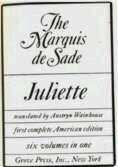Juliette (novel)
Juliette is a novel written by the Marquis de Sade and published 1797–1801, accompanying Sade's 1797 version of his novel Justine. While Justine, Juliette's sister, was a virtuous woman who consequently encountered nothing but despair and abuse, Juliette is an amoral nymphomaniac murderer who is successful and happy. The full title of the novel in the original French is L'Histoire de Juliette ou les Prospérités du vice, and the English title is "Juliette, or Vice Amply Rewarded" (versus "Justine, or Good Conduct Well-Chastised", about Juliette's virtuous sister). As many other of his works, Juliette follows a pattern of violently pornographic scenes followed by long treatises on a broad range of philosophical topics, including theology, morality, aesthetics, naturalism and also Sade's dark, fatalistic view of world metaphysics.
 Title page of 1968 translation by Austryn Wainhouse | |
| Author | The Marquis de Sade |
|---|---|
| Original title | L'Histoire de Juliette, ou les Prospérités du vice |
| Country | France |
| Language | French |
| Genre | Libertine, philosophical novel |
Publication date | 1797 |
| Media type | Print (Hardback & Paperback) |
| Preceded by | La Nouvelle Justine |
| Followed by | The Crimes of Love (1800) |
Plot summary
Juliette is raised in a convent. However, at age thirteen she is seduced by a woman who immediately explains that morality, religion and other such concepts are meaningless. There are plenty of similar philosophical musings during the book, all attacking the ideas of God, morals, remorse, love, etc., the overall conclusion being that the only aim in life is "to enjoy oneself at no matter whose expense." Juliette takes this to the extreme and manages to murder her way through numerous people, including various family members and friends.
As in Justine, there are several explicit references connecting an abundance of food to physical love and sexual pleasure. After an orgy, at the beginning of the book, Delbene says "Good plentiful food makes one efficient for physical love" and later chapters mention alcohol and "splendid wine and opulent food".
During Juliette's life from age 13 to about 30, the wanton anti-heroine engages in virtually every form of depravity and encounters a series of like-minded libertines. She meets the ferocious Clairwil, whose main passion is in murdering young men and boys as revenge for the man's brutality to her sex. She meets Saint Fond, a 50-year-old multi-millionaire who commits incest with his daughter, murders his father, tortures young girls to death on a daily basis and even plots an ambitious scheme to provoke a famine that will wipe out half the population of France. In her journeys she also becomes acquainted with Minski, a nomadic, ogre-like Muscovite, who delights in raping and torturing young boys and girls to death and consuming the remains.
Real people in Juliette
A long audience with Pope Pius VI is one of the most extensive scenes in Juliette. The heroine shows off her learning to the pope (whom she most often addresses by his secular name "Braschi") with a verbal catalogue of alleged immoralities committed by his predecessors. The audience ends, like almost every other scene in the narrative, with an orgy (Pius is portrayed as a secret libertine himself).
Soon after this, the male character Brisatesta narrates two scandalous encounters. The first is with "Princess Sophia, niece of the King of Prussia", who has just married "the Stadtholder" at the Hague. This is presumably intended for Wilhelmina of Prussia, Princess of Orange, who married William V of Orange, the last Dutch Stadtholder, in 1767, and was still alive when Juliette was published thirty years later. The second encounter is with Catherine the Great, Empress of Russia.
Publication and reception
Both Justine and Juliette were published anonymously. Napoleon ordered the arrest of the author, and as a result de Sade was incarcerated without trial for the last thirteen years of his life.
The essay (Excursus II) "Juliette or Enlightenment and Morality" in Max Horkheimer and Theodor Adorno's Dialectic of Enlightenment (1947) analyzes Juliette as the embodiment of the philosophy of enlightenment. They write: "she demonizes Catholicism as the most-up-to-date mythology, and with it civilization as a whole […] her procedures are enlightened and efficient as she goes about her work of sacrilege […] She favours system and consequence." This claim has been criticized though.[1]
See also
Bibliography
- Juliette. Translated by Wainhouse, Austryn. 1968. OCLC 976556170.
References
External links
| Wikimedia Commons has media related to Marquis de Sade. |
- Full text of Juliette, in French
- Online exhibition on illustrations of Juliette, by the World Museum on Erotic Art
- (in French) La nouvelle Justine, ou les malheurs de la vertu, suivie de l'Histoire de Juliette, sa soeur, vol. 5, vol. 6, vol. 7, vol. 8, vol. 9, vol. 10, en Hollande, 1797.
.png)